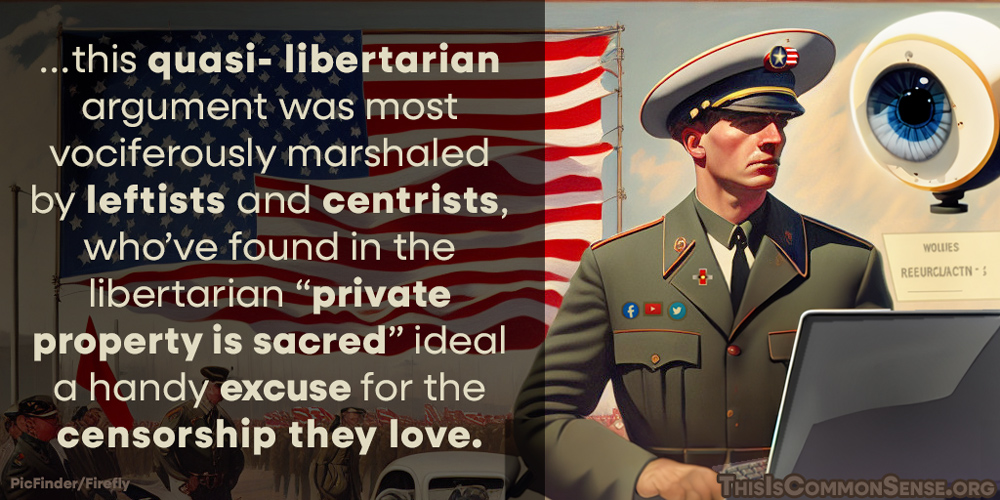“Many people insist that governments aren’t involved in censorship,” tweeted Michael Shellenberger on Tuesday, “but they are. And now, a whistleblower has come forward with an explosive new trove of documents, rivaling or exceeding the Twitter Files and Facebook Files in scale and importance.”
Because much of recent years’ censorship has occurred on corporate-owned-and-run social media platforms, like YouTube, Facebook and Twitter (now X), some have claimed “it’s not censorship” and, because private, is immune to legal prosecution. This quasi-libertarian argument was most vociferously marshaled by leftists and centrists, who’ve found in the libertarian “private property is sacred” ideal a handy excuse for the censorship they love.
They love it because of what they hate: Fox News, most specifically, and alternative media based on podcasting and vlogging platforms, more generally. These media outlets have bucked the foreign policy establishment as well as the new racism of Critical Race Theory, and official narratives about COVID.
So they must be squelched — as “disinformation.”
This is all made more clear in what Shellenberger calls “The CTIL Files.”
The leaked documents “describe the activities of an ‘anti-disinformation’ group called the Cyber Threat Intelligence League,” which “officially began as the volunteer project of data scientists and defense and intelligence veterans but whose tactics over time appear to have been absorbed into multiple official projects, including those of the Department of Homeland Security.’’
While government operatives and contractors organized, at first, to avoid constitutional and legislative limitations to conducting propaganda and psychological warfare against Americans, the plan was, from the beginning (says the source), “to become part of the federal government.”
In the end, “the military and intelligence agencies” got involved, along with “civil society organizations and commercial media.” Methods used include burner phones, plausible deniability, and “sock puppet accounts and other offensive techniques.”
You can watch today’s hearing (10:00 AM EST) of the Select Subcommittee on the Weaponization of the Federal Government, featuring Shellenberger, Rupa Subramanya, and Matt Taibbi.
Tell me what you think.
This is Common Sense. I’m Paul Jacob.
Illustration created with PicFinder and Firefly
See all recent commentary
(simplified and organized)
See recent popular posts

4 replies on “The Censorship Industrial Complex”
Even without the involvement of the state, a major problem with the invocation of property rights is that these social-networking/media sites defrauded large shares of their user bases.
At the outset, when these firms needed users, platforms that had declared and enforced ideologic biases already existed; they obviously didn’t attracted content from those against whom their biases ran. By representing themselves as common carriers and their platforms as of free speech, Facebook, Twitter, and YouTube were able to displace rivals (such as MySpace), that might otherwise have drawn those users. And those users didn’t merely show-up; they generated content that drew each other, than was essential to the commercial success of these firms, that had economic value. These firms got something of economic value, but failed to provide what they said that they would give in return.
Of course, that these firms went beyond that fraud, to work as agents of the state, is all the more terrible.
Civil actions should be brought against the perpetrators. And I don’t simply refer to the firms, but to the employees who sat at the keyboards. Each and every one of them should suffer financial ruin, so that, when next such a project of censorship is imagined, those otherwise expected actually to effect it are inclined to resist, to resign, to sound alarms.
As if on cue, the White House has announced that it will no longer warn Meta about foreign interference from China and Russia. None of the activities that you cite are censorship. There’s no attempt by any platform to smother any message. There are just messages they will not be forced to carry. The aggressors are the radical Libertarians who want to force private companies to carry every message. It’s just not going to happen. I think that this column is written for your base. I find it completely unpersuasive. But it is much as persuasion is not your intention it’s still successful. You will identify your ringers. Ding ding ding
Why do you post a comment whose argument is already exploded above?
Paul’s entry focusses upon the government acting to cause these platforms to censor. That matter is different from a purely private decision to censor.
And my comment before yours (made visible before you commented) points to the fraud entailed in the censorship. Once these platforms exchanged some of their rights for such things as user-generated content, the property rights in question became those of the users.
Maybe I’ll get to see it later on C‑SPAN. Thanks for the heads up.